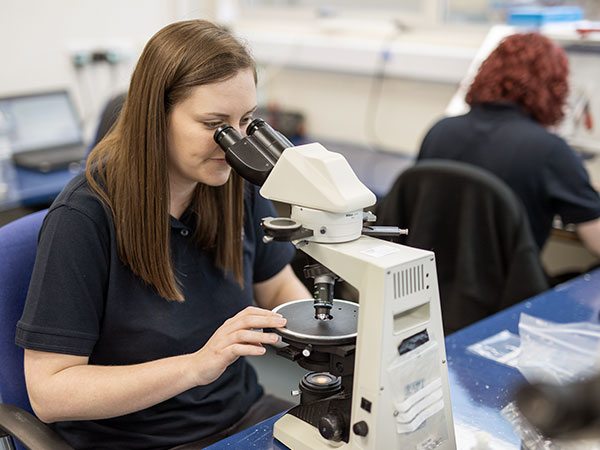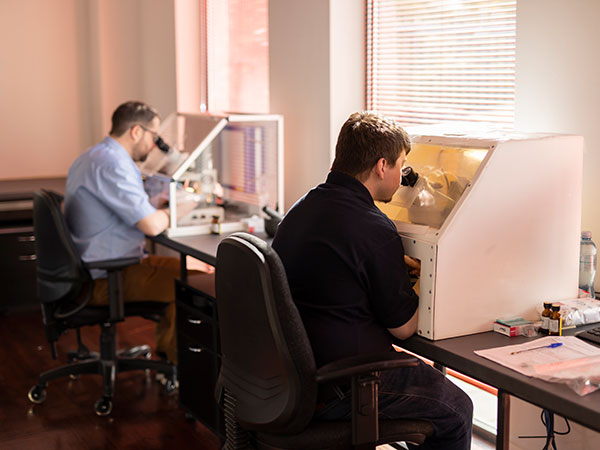South West England
- 01823 443898
Northern Ireland
- 02840 623566
Asbestos sample analysis is an important process to determine whether a material contains asbestos or not. Over time, more than 3,000 products have been developed that contain asbestos; many of these were used in the building trade. Asbestos was a popular building material before its harmful effects were discovered, and many buildings constructed before 2000 may still contain asbestos. G&L understands the importance of fast asbestos testing turnaround times as health is a priority and it may hinder your project deadlines.
G&L has purpose-built laboratories with H-type filtering glove boxes for the analysis of bulk samples for the presence of asbestos. G&L holds UKAS accreditation for the analysis of bulk samples to identify all the six regulated asbestos fibre types in accordance with the HSE document ‘Asbestos: The Analysts’ Guide.’ (HSG248) .
All sample analysis observations are recorded on TEAMS (The Electronic Asbestos Management System) , where reports can be downloaded from our client portal at your convenience or stored there for future reference.
Our laboratory operates a pre-arranged ‘same-day turnaround’ service for many clients whereby samples are received in the morning, and the report is emailed to the client by the end of the day. For particularly urgent single samples that are delivered to the laboratory, they can be analysed while you wait and enjoy a coffee in our rest area. Following the analysis of samples our experts are pleased to provide any necessary advice regarding results obtained and further actions required.
The asbestos analysis process involves the examination of a representative sample of a material suspected to contain asbestos. Our laboratory conducts a detailed examination of the sample using a low power stereo microscope. Fibres observed in the course of these examinations are categorised tentatively based on their observable physical characteristics and then removed from the sample and placed in the appropriate Refractive Index (RI) liquid on a microscope slide.
Once mounted in the correct RI liquid, the fibres are then positively identified as one of the six regulated asbestos types, based on their detailed optical properties using polarised light microscopy (PLM):
Based on the type of asbestos fibre(s) contained in the sample, the matrix of the material, and the description of the sample from the sampler, G&L will classify each sample as one of the following:
G&L are members of the TEAMs Sample Exchange Program, built directly into TEAMS, which allows samples collected by other TEAMS clients to be submitted to G&L for analysis. This system provides automatic transfer of sampling information to G&L TEAMS and instant return of reports following approval.


Use the form below to submit your sample analysis. Once submitted proceed to the checkout to complete purchase.
We are accredited / certificated for:
Our UKAS accreditation is limited to those activities described on our UKAS schedule of accreditation.
Click here to find out more about all our accreditations / certifications.
Single analysis to determine asbestos content and classification
Per sample
(1 – 3 samples)
Per sample
(4+ samples)
Results within 2 – 3 days of receipt of sample
£54.00
(£45.00 + VAT)
10% discount
Results on the next working day after receipt of sample
£66.00
(£55.00 + VAT)
10% discount
Results on same day (while you wait)
£144.00
(£120.00 + VAT)
10% discount
All prices are subject to the addition of VAT at the 20% rate.
Samples must be safely delivered to the laboratory by hand or by an appropriate courier. Please ensure that sufficient postage is used as incorrect postage will result in analysis delays and / or additional costs.
All samples must be double-bagged, sealed and clearly labelled with the purchase reference and sample reference. Your name and address and contact details must also be included with the samples.
Please note: if the samples are delivered after 4pm, the time of receipt of sample will be at 0830 the next working day. Same day results cannot be guaranteed on samples that are delivered to the laboratory after 1400. Same day results on large batches of samples must be agreed in advance with the laboratory. If samples are wet when submitted they need to be dried prior to analysis so it may take up to a day longer to receive the results. Same day results cannot be guaranteed on wet samples. G&L Consultancy Ltd will not accept any sample that is deemed to be either unsuitable or unsafe for analysis. Samples must be of at least 1 cm2 (unless otherwise indicated) in size in order to enable accurate analysis and classification of the material type.
If samples are hand delivered to the laboratory you are required to sign the samples register to confirm the chain of custody. If samples are received by post, the number of samples in the batch will be checked when opened and you will be informed immediately if there are any discrepancies.
If a large sample is submitted for analysis (greater than approximately 15 cm x 15cm) a supplementary fee of £10 + VAT per sample may be charged for additional sample preparation. Any additional costs incurred for disposal of large samples will be passed on to the client (unless collection of the sample is preferred.)
Each sample submitted is inspected for all possible types of asbestos. We are not permitted to give an estimation of the percentage asbestos content within the material, or any indication of the amount of fibre present. Any sample classifications given are based on observation alone which is outside the scope of our UKAS accreditation.
All samples are kept for a period of six months following analysis prior to disposal at a licensed asbestos disposal site. If you wish the sample to be retained for longer, or returned, we must be contacted within this six-month period.
Water Absorption Test to determine accurate classification of asbestos cement / asbestos insulating board samples requires a sample of at least 9 cm2 and is only available on a 7 day turnaround. Please phone the office in advance to discuss your requirements if you need a water absorption test.
UKAS Impartiality Assessment
In order to ensure G&L Consultancy remain impartial and are able to provide a high quality service to all clients equally, we would must be provided any information regarding any links you may have to G&L which affect our judgement in carrying out work for you.
By accepting this service agreement you are confirming that you do not have any links (personal or professional) to any staff at G&L Consultancy Ltd. If you are aware of any links, please contact the office to discuss your requirements.
BULK SAMPLING TERMS OF BUSINESS
By accepting this service agreement you are confirming that you are in agreement with the above TERMS OF BUSINESS.
Samples must be taken in a careful, controlled manner following the procedures below to ensure fibres are not released causing potential contamination. It is not recommended that samples are taken of any insulations and highly fibrous materials unless you have training and experience in safe sampling procedures. If in any doubt, please contact us for advice.
Prior to sampling, inspect the material for areas of existing damage where a piece can easily be removed. You need to take a sample of approximately the size of a two pence piece. If there are no areas of existing damage, a small sample should be taken from a discrete location at the corner or edge of the material.
It is recommended that a disposable FFP3 respirator or a half mask fitted with a P3 filter and Type 5 coveralls are worn for all sampling.
If there is no existing damage, use a sharp knife or chisel blade to gently slice off a small piece of the material and place it directly into a polythene bag. The bag must then be sealed and placed in a second polythene bag which is again sealed. Your hands, all sampling equipment and any debris produced during the sample must then be wiped up, using a wet wipe and placed in a separate polythene bag and then double bagged for disposal, along with the face mask and coverall.
If sampling a textured coating, such as ‘Artex’, samples should be obtained by carefully scraping the coating with a screwdriver or narrow scraper, directing the material directly into the sample bag held below the sampling point. Scrapings should be taken from a number of areas within the room in order to get sufficient sample for analysis.
This sampling information is taken from HSG264 – Asbestos: The Survey Guide
Should you require any further safety guidance with the sampling of asbestos containing materials, please contact us as follows; Somerset Office 01823 443 898 or Northern Ireland Office 028 40623566.